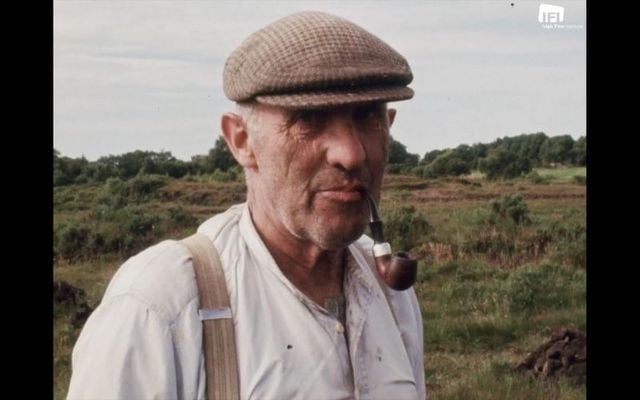"The Stones Will Speak," a short Irish film from 1974, is now available to stream for free via the Irish Film Institute's IFI Archive Player.
Over magnificent images of Irish natural beauty, featuring Ben Bulben, Achill Island, and Kylemore Abbey amongst other sites, voices of residents of the west coast tell the stories of their lives – dispelling romantic notions of rural life with tales of immigration, loneliness, and hard work.
The first sequence tells the story of an elderly man who recalls memories of cycling to football matches and dancing at the crossroads, but now he and his wife miss their children and grandchildren who have taken the winding road to the city.
Another story is of a farmer who expresses middle-aged regret, the years spent waiting to inherit the family farm, and being unable to find a wife once his father signed it over on his deathbed.
The final tale imagines the thoughts of a fisherman’s son who dreams with naïve optimism about his future when his father is forced to sell his boat and work in the fields.
Written by Fr Cyril Farrell, prior of Benburb Monastery the fictional narration, voiced by Fr Dermot McNeice, has an air of truth, bearing witness to the changeless beauty of the Irish countryside but equally the harsh reality that a man cannot live on beauty or support his family on folklore.
"The Stones Will Speak" is part of The Terence McDonald Collection.
The Irish Film Institute's Terence McDonald Collection
Terence McDonald was a teacher, film historian, film collector, and pioneering amateur filmmaker. Born in the city of Derry in 1926, the films he made during his lifetime are diverse in genre and subject. They range from short comedies and experimental films to expository documentaries covering topics such as traveling and cross-community theatre, mental health services, and films that promoted Derry as a developing city looking hopefully to the future.
His work includes personal projects and films commissioned or supported by a range of public bodies. Terence produced his films under the ‘Fairview Films’ banner, a title derived from the name of the family home in Rosemount Avenue, and somewhat intentionally misleading as he alone undertook all aspects of the work.
With a deep understanding of all aspects of production – his credits include cinematographer, editor, sound recordist, producer, and director – along with a wide knowledge of cinema, McDonald created visually sophisticated and culturally rich work. His films, shot primarily on 16mm film, feature a variety of references and influences, from Battleship Potemkin to Peyton Place, Alfred Hitchcock and Jacques Tati to Buster Keaton and Charlie Chaplin.
They also received widespread recognition with awards from the British Film Institute, the Munich Film Festival and the National Film Institute (now IFI) Annual Film Competition.
McDonald’s work has a notable sense of place. It not only represents the natural beauty of Northern Ireland but captures the various sides of his hometown of Derry through filmic portraits of the city, from the Georgian architecture and thrice–sieged city walls to the growing facilities and industries of the ‘60s. His two homages to the silent comedy era, The Fugitive and The Man from A.U.N.T., offered local audiences the opportunity to see their home on the big screen (perhaps for the first time) as the backdrop to slapstick capers making full use of the city’s walls and hilly streets.
McDonald had several frequent collaborators. Fellow Derry native and former schoolteacher, future Nobel Peace Prize winner John Hume worked with McDonald on several projects promoting the region to potential donors and international tourists, starting with A City Solitary in 1963 and the subsequent The City of Londonderry and Two Hours from London, which all depict an optimism about the prospects for the divided city.
Fr Cyril Farrell, prior of the Benburb monastery, was involved in several of McDonald’s more spiritual pieces, writing Christ-like fable The Secret as well as the cross-community play The Story of Man captured in the documentary Benburb.
Another writer who penned several scripts for McDonald was Gerry Wills, who wrote McDonald’s internationally successful Nebelung, as well as lending his voice to narrate documentaries Ballinascreen and The Portable Theatre.
Northern Irish folk singer Gemma Hasson features in the scores of The Stones Will Speak, Long Hard Road, The Secret, and Requiem for Sally.
The Terence McDonald Collection is held and preserved by the IFI Irish Film Archive and these films are made available with the kind permission of Peter McDonald and Northern Ireland Screen.
"The Stones Will Speak" is published here thanks to the Irish Film Institute (IFI), who IrishCentral has partnered up with throughout 2023 to bring you a taste of what their remarkable collection entails. You can find all IrishCentral articles and videos from the IFI here.
To watch more historic Irish footage, visit the IFI Archive Player, the Irish Film Institute’s virtual viewing room that provides audiences around the globe free, instant access to Irish heritage preserved in the IFI Irish Film Archive. Irish Culture from the last century is reflected through documentaries, animation, adverts, amateur footage, feature films, and much more. You can also download the IFI Archive Player App for free on iPhone, Android, Apple TV, Amazon Fire TV, and Roku.
IrishCentral has partnered up with the IFI throughout 2023 to bring you a taste of what their remarkable collections entail. You can find all IrishCentral articles and videos from the IFI here.



